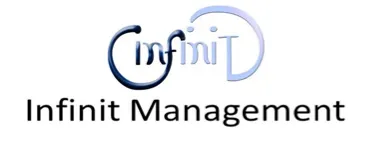CALL FOR A FREE CONSULTATION: 1-800-610-5339
INFO@INFINITMANAGEMENT.COM
About Us

WHO WE ARE
Dedicated to excellence and service.
Our mission is to empower entrepreneurs to achieve their biggest business goals with proper funding. We help business owners find the credit, capital, and support needed to establish and grow a thriving business.
Get access to up to $150k in business credit lines, Traditional Financing such as SBA Financing, and the widest selection of Alternative Business Lending products. Plus we empower your growth with coaching, motivation and accountability, and a community of like-minded business owners. We go beyond just financing – we give you the tools and support needed to take your business to the next level. Let’s work together to fund your dreams a reality.
Live Expert Coaching and Support
Personalized Funding Strategy
24/7 Online Access
OUR EXPERTISE
Dedicated to Finding You The Best Funding
Get the expert guidance you need to find the best funding option for your growing business. Let’s create the perfect funding plan to get your business the money it needs to grow!
OUR BLOG
Latest News & Article

Unveiling the Power of Business Credit
A Comprehensive Guide to Building and Leveraging Business Credit
In the world of business, credit is often a vital lifeline that fuels growth and expansion. While personal credit is well-understood, the realm of business credit remains somewhat enigmatic to many entrepreneurs. However, understanding and effectively leveraging business credit can be a game-changer for companies of all sizes. In this comprehensive guide, we will delve into the intricacies of business credit, from its importance and benefits to strategies for building and maximizing it for your enterprise's success.
Understanding Business Credit:
Business credit refers to a company's ability to borrow money or obtain goods and services on credit, based on its perceived ability to repay debts. It is distinct from personal credit and is tied to the business entity rather than an individual. Establishing strong business credit can provide numerous advantages, including easier access to financing, better terms on loans, and enhanced credibility with suppliers and vendors.
Importance of Business Credit:
Separation of Personal and Business Finances: One of the primary reasons for establishing business credit is to separate personal and business finances. By doing so, entrepreneurs protect their personal assets and ensure that the business stands on its own financial footing.
Access to Financing: Businesses with strong credit profiles are more likely to secure financing from banks, credit unions, and other financial institutions. This access to capital is crucial for funding growth initiatives, purchasing inventory, or investing in equipment.
Better Loan Terms: Good business credit can result in more favorable loan terms, including lower interest rates, higher borrowing limits, and longer repayment periods. This can translate into significant cost savings over time.
Vendor Relationships: Suppliers and vendors often extend credit terms to businesses with solid credit histories. Establishing positive relationships with vendors can lead to favorable payment terms, discounts, and increased purchasing power.
Business Expansion: A robust credit profile can support business expansion efforts, whether through opening new locations, launching new product lines, or entering new markets. It provides the financial flexibility necessary to seize growth opportunities.
Building Business Credit:
Building business credit is a proactive process that requires careful planning and execution. Here are some steps to help entrepreneurs establish and strengthen their business credit profiles:
Incorporate Your Business: Establishing a separate legal entity, such as a corporation or limited liability company (LLC), is the first step in building business credit. This separates personal and business finances and creates a distinct credit identity for the company.
Obtain an Employer Identification Number (EIN): An EIN is a unique identifier assigned to businesses by the Internal Revenue Service (IRS). It is essential for opening bank accounts, filing taxes, and applying for credit.
Open a Business Bank Account: Opening a dedicated business bank account demonstrates financial stability and separates business transactions from personal finances. It is a fundamental step in building credibility with lenders and creditors.
Establish Trade References: Building trade references involves establishing relationships with suppliers and vendors who report payment history to business credit bureaus. Timely payments to these vendors can help establish positive credit history for your business.
Apply for a Business Credit Card: A business credit card can be an effective tool for building credit, as it allows businesses to make purchases and establish a repayment track record. It is essential to choose a card with favorable terms and to use it responsibly.
Monitor Your Credit Profile: Regularly monitoring your business credit report allows you to identify errors or inaccuracies and take steps to address them promptly. It also enables you to track your progress and identify areas for improvement.
Leveraging Business Credit:
Once you have established a solid business credit profile, it's essential to leverage it effectively to support your company's growth and success. Here are some strategies for maximizing the benefits of business credit:
Access to Financing: With a strong credit profile, businesses can access a variety of financing options, including traditional bank loans, lines of credit, and business credit cards. Evaluate different financing options based on your company's needs and objectives.
Negotiate Better Terms: Armed with good credit, businesses can negotiate more favorable terms with lenders, suppliers, and vendors. This may include lower interest rates, extended payment terms, or higher credit limits.
Expand Your Vendor Network: Building strong relationships with vendors and suppliers can lead to additional benefits beyond credit terms. Explore opportunities to collaborate with key partners and suppliers to drive mutual growth and success.
Invest in Growth Initiatives: Use business credit to fund strategic growth initiatives, such as expanding into new markets, investing in marketing and advertising campaigns, or upgrading technology and infrastructure. Access to capital can accelerate growth and help businesses capitalize on opportunities.
Manage Cash Flow Effectively: While credit can provide valuable financial flexibility, it's essential to manage cash flow effectively to avoid overleveraging your business. Develop a comprehensive cash flow management strategy that accounts for both inflows and outflows of cash.
Reinvest Profits Wisely: As your business grows and generates profits, reinvesting those profits back into the business can further strengthen your credit profile and fuel future growth. Consider reinvesting profits in areas such as research and development, employee training, or infrastructure improvements.
Conclusion:
Business credit is a powerful tool that can significantly impact the success and growth of a company. By understanding the importance of business credit, actively building a strong credit profile, and leveraging credit effectively, entrepreneurs can position their businesses for long-term success and prosperity. Whether you're a small startup or an established enterprise, investing time and effort into managing and optimizing your business credit can yield substantial returns and unlock new opportunities for growth and expansion.
Testimonials
Real results from business owners just like you

Cheryl Reisner, a former bank lender from Shreveport, Louisiana. The suite’s business credit building process unlocked more funding options than she ever imagined, opening up new possibilities for her business. Cheryl believes every business owner can benefit from the Business Finance Suite, as it revolutionizes how they operate.

Louis, a Miami-based business owner found success using the Business Finance Suite, which helped establish a business credit profile. This enabled them to apply for funding without using their Social Security number, eliminating personal liability for credit applications. The speaker highly recommends this program to fellow business owners.

Edward from El Paso, Texas, struggled to secure funding for his small businesses until discovering the Business Finance Suite. Within a month, the suite helped set up his business correctly, establish trade lines and revolving credit, and now he’s on track to receive funding. Edward guarantees it’s worth the investment and only wishes he’d found it sooner.


